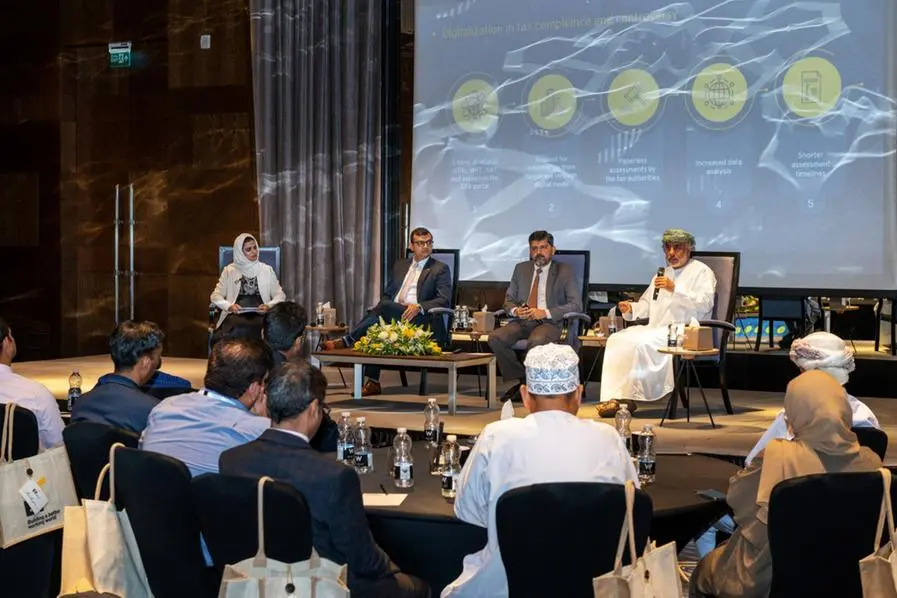PHOTO
Muscat, Oman – This week EY held Reshaping the Future of Tax 2023 – Oman seminar to address key tax topics relevant to businesses operating in the country. The event provided the latest updates on the local, regional, and global tax environment, tax policies, recent tax trends across the MENA region with a focus on the GCC, as well as sustainability.
Ahmed Al-Esry, EY MENA Tax Leader, says:
“The tax landscape in the MENA region is constantly evolving as tax increasingly becomes an important source of revenue for governments as they seek to diversify their sources of income and as an important policy tool to drive changes in the economy. This makes it critical for all businesses in Oman to be up to date with their operating models and regularly review how the function is complementing their finance procedures – including the use of technology to streamline processes – to ensure they are thoroughly prepared ahead of any government announcements and can maintain compliance.”
At the seminar, EY global and regional tax leaders discussed how the future of tax is being reshaped and the growing significance of tax in Oman. The recently announced 2023 National Oman Fiscal Budget mentioned 11% of the GDP being accounted as the tax revenue, highlighting the importance of multiple income streams to support the country’s transition to a non-hydrocarbon driven economy.
In addition to key Oman tax practices, attendees went over general recent tax trends across MENA, tax policy evolution, VAT developments, the introduction of the UAE Corporate Tax, transfer pricing developments and the progress of BEPS Pillar 2. The tax seminar saw the participation of over 150 CFOs, tax directors, tax and finance managers, lawyers, and business owners.
Alkesh Joshi, Oman Tax Leader and EY MENA Energy & Sustainability Tax Leader, says:
“Businesses in Oman are aware that they need to stay up to date on tax directives but may not realize how quickly the changes will come and the impact they will see on their transactions. In addition, with any new tax regulations comes challenges around the interpretation of various provisions and data transparency. It is critical that organizations have a separate tax team and an ERP system ready to address issues or discrepancies on every transaction. By ensuring that the tax function is agile and compliant, businesses will be able to more efficiently incorporate any amendments to the Corporate Income Tax Law and expansion of the Double Tax Treaty network between GCC countries.”
Businesses can also expect to see an emphasis on the use of technology by the Oman Tax Authority (OTA). The digitalization of tax compliance and controversy will focus on the e-filing of returns on the OTA portal, requests for more information from taxpayers made digitally, paperless assessments by the tax authority, increases data analytics, and shorter assessment timelines.
The VAT journey in Oman
The Oman tax landscape has seen several amendments to VAT laws over the past 12 months. On 15 October 2022, the VAT Executive Regulations were amended, with 10 amendments to existing articles, and the inclusion of 2 additional clauses to existing articles. The amendments also involved the VAT exemption of financial services, meaning businesses other than financial institutions are now eligible to exempt their sale of financial services. Furthermore, the OTA has recently requested that all large taxpayers and nonresident taxpayers submit the taxpayer checklist along with the quarterly VAT return.
Key drivers for tax policy reform in the MENA Region
In a post-pandemic world that has seen a fast-moving digital economy and a continuously evolving international landscape, tax policy and administration reform is at the top of the agenda for governments. The MENA region is witnessing the implementation of major strategic policy changes with some of the key drivers of change being:
- Economic recovery
- Revenue diversification away from hydrocarbons
- Stimulation of the business climate to drive economic growth
- Promotion of investment in specific growth sectors
- Alignment with regional and international commitments, including the OECD’s BEPS project
- Green agenda and sustainability commitments
Other macrotrends affecting fiscal policy both globally and regionally include: the digitization of governments and businesses, environmental concerns, growing government debt and aging populations, globalized supply chains, and a growing need to combat cross-border harmful practices. These have led to an increase in the policy initiatives seen: Tax administration 3.0, the rise of ESG best practice, revenue raising and diversification, Special Economic Zones (SEZs), and international tax trends such as BEPS 2.0, FATCA, TP rules, and more.
ESG on the rise
MENA governments are showing growing interest in ESG as part of their strategy frameworks. For example, Egypt has introduced green bonds and implemented a fuel tax under the Schedule Tax System. In addition, the Kuwait Investment Authority (KIA) has applied an independent globally recognized ESG standard.
If they have not already done so, companies in the region should start looking into integrating ESG in management practices, reducing their carbon footprints, and assessing opportunities and the potential impacts on the cost of doing business.
-Ends-
About EY | Building a better working world
EY exists to build a better working world, helping to create long-term value for clients, people and society and build trust in the capital markets.
Enabled by data and technology, diverse EY teams in over 150 countries provide trust through assurance and help clients grow, transform and operate.
Working across assurance, consulting, law, strategy, tax and transactions, EY teams ask better questions to find new answers to the complex issues facing our world today.
EY refers to the global organization and may refer to one or more of the member firms of Ernst & Young Global Limited, each of which is a separate legal entity. Ernst & Young Global Limited, a UK company limited by guarantee, does not provide services to clients. Information about how EY collects and uses personal data and a description of individuals’ rights under data protection legislation are available via ey.com/privacy. EY member firms do not practice law where prohibited by local laws. For more information about our organization, please visit ey.com.
The MENA practice of EY has been operating in the region since 1923. For over 98 years, we have grown to over 7,500 people united across 21 offices and 15 countries, sharing the same values and an unwavering commitment to quality. As an organization, we continue to develop outstanding leaders who deliver exceptional services to our clients and who contribute to our communities. We are proud of our accomplishments over the years, reaffirming our position as the largest and most established professional services organization in the region.
© 2023 EYGM Limited.
All Rights Reserved.
This material has been prepared for general informational purposes only and is not intended to be relied upon as accounting, tax, legal or other professional advice. Please refer to your advisors for specific advice.
ey.com
This news release has been issued by EYGM Limited, a member of the global EY organization that also does not provide any services to clients.
Contact
Rianna Khan Ewan Abbasi
MENA Public Relations MENA Public Relations
rianna.khan@ae.ey.com ewan.abbasi@ae.ey.com




















